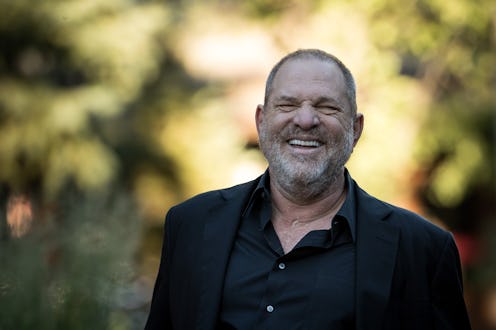Life
Why I Defended, Supported, And Enabled Bad Men

Last week, as Harvey Weinstein went from celebrated Hollywood producer to disgraced outcast, and a list of “shitty media men” made the rounds among women in publishing and media before abruptly disappearing, it was easy to feel overwhelmed by the seeming omnipresence of men who abuse their female coworkers, colleagues, subordinates, and significant others. And yet it wasn’t just the men who fueled my despair: everywhere I looked, it seemed as though there were women — often outspoken, accomplished, feminist women — lining up to support and defend men who’d been accused of abuse.
Whether it was celebrities like Donna Karan or Lindsay Lohan, or even Weinstein’s now former attorney Lisa Bloom, there were numerous women who seemed eager to supply a counter-narrative — to question the motives of accusers or vouch for the accused. “I know this man,” they all seemed to say, “And he’s never done anything bad to me.” As fellow women, they implied, they were blessed with the ability to sniff out a true creep — and if they were fine with their friend, then shouldn’t the rest of us be?
There’s a creeping discomfort that works its way through my bones whenever I see a woman lining up to cast aspersion on a claim of abuse; to throw her reputation on the line to defend an obviously bad dude. It’s not just because it upsets me to see women — often thoughtful, feminist women — so easily blinded to a man’s faults.
It’s because I know exactly what’s going through these women’s heads. I used to be one of them.
I started defending bad men for the same reason most women do: I was dating one. I had a boyfriend who was an emotional abuser. Over our years together, he slowly chipped away at my self-esteem, my support network, even my ability to trust people.
When you’re in an abusive relationship, defending shitty men becomes second nature. It is, quite literally, a survival strategy. Admitting to yourself that you’re partnered with an abuser can be a terrifying task, so your brain finds ways to justify all the horrible abuse you’re subjected to. Your partner isn’t cruel, he just loves you enough to be brutally honest; he didn’t lie to you, you just must have misunderstood what he meant.
The more horrific your partner’s actions become, the more imperative it feels to normalize them — and the justifications become so second nature that it’s easy to extend them to your partner’s behavior with other people.
If I’d admitted to myself that my boyfriend’s actions towards my friends were creepy, it would have opened up a whole Pandora’s box of horrific revelations that I was not ready to confront. It was easier to tell myself that it was normal for my partner to secretly rifle through a friend’s suitcase and fondle her underwear, because to acknowledge that I had signed a lease with the kind of monster who’d do that to his girlfriend’s friend meant coming to terms with the reality that I’d trapped myself in a nightmare relationship.
But abuse victims aren’t the only ones who find themselves justifying the often indefensible behavior of men. And in many ways, it’s another bad man I stood up for who fills me with the deepest guilt and regret.
Around the time that I was divesting myself of my awful boyfriend, I was becoming closer with another friend. When I told him about the abuse, he took my side; an act of validation that I found deeply affirming. For years, he hooked me up with work and connections, embedding himself deeper into my life and social circle.
In retrospect, the signs of his awfulness were there all along: an “edgy” sense of humor, a disdain for consequences, a disregard for the damage he might inflict upon others in pursuit of his goals. But at the time, those things didn’t affect me. At the time, I didn’t think they were a big deal. At the time, I assumed it was part and parcel of being young and ambitious and embedded in the punishing world of New York media.
And because they didn’t affect me, I ignored them. When my friend lashed out at an ex by releasing a grotesque video in which he mocked her appearance, sexual prowess, and personality, I let myself be convinced that he was justified, that his brutal misogyny was just a joke, that she’d started it anyway so fair was fair. When he wrote up a post for the website we co-ran that hinged on a lukewarm rape joke, I pushed back my hesitation and let him publish it, because I assumed that he knew more than I did about what was and wasn’t appropriate.
I am deeply grateful that we stopped being friends before he was arrested for physically assaulting his then-girlfriend, before he violated her restraining order against him and was thrown back into jail. I’d like to think that my ability to rationalize his behavior would have run out by that point — but judging by the many women who stood by him and defended him even after his arrest, I’m not sure that I can say I wouldn’t have joined in with them.
Why do women protect, defend, and support terrible men? For me, it was because it was easier to make excuses for the men in my life than to admit I’d bedded and befriended people with truly horrific attitudes towards women. Because it was easier to argue that other women deserved their mistreatment than to acknowledge I’d been taken in by another charming abuser. Because I didn’t want to believe that someone whose company I enjoyed, someone who made my life immeasurably better, was someone who could make someone else’s life unimaginably worse.
I defended men because — whatever my feminist principles — the tradeoff seemed worth it at the time. But it wasn’t. And it never is.